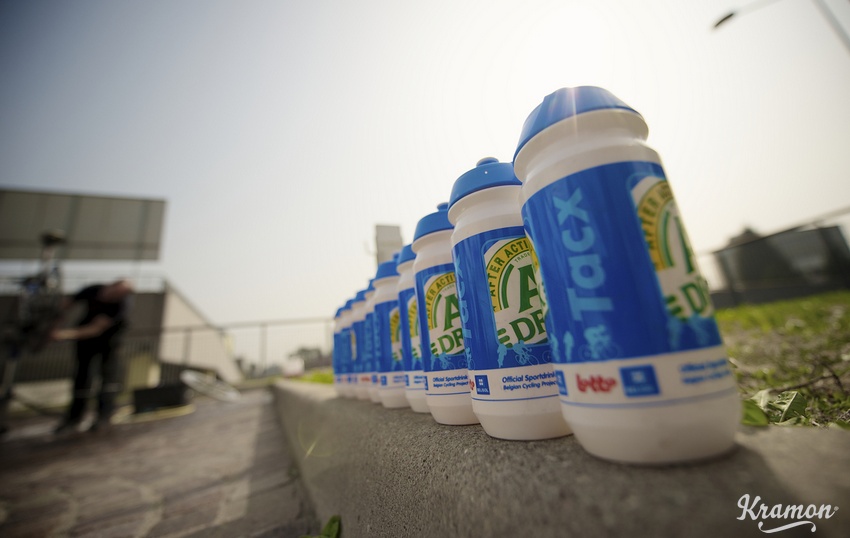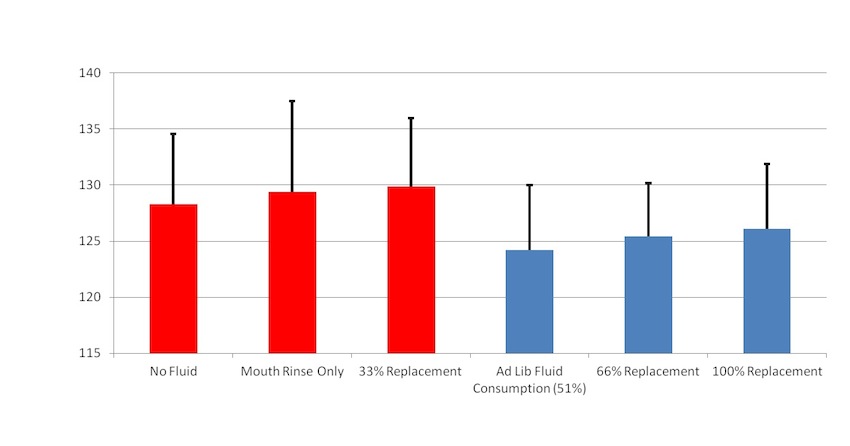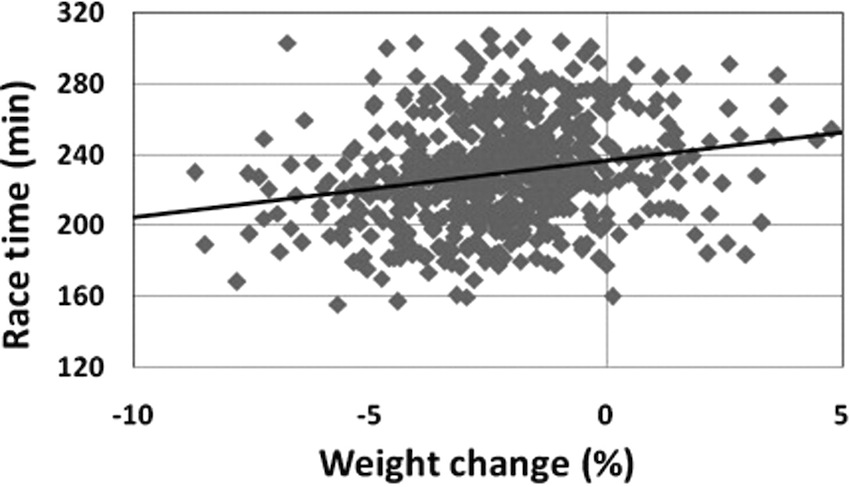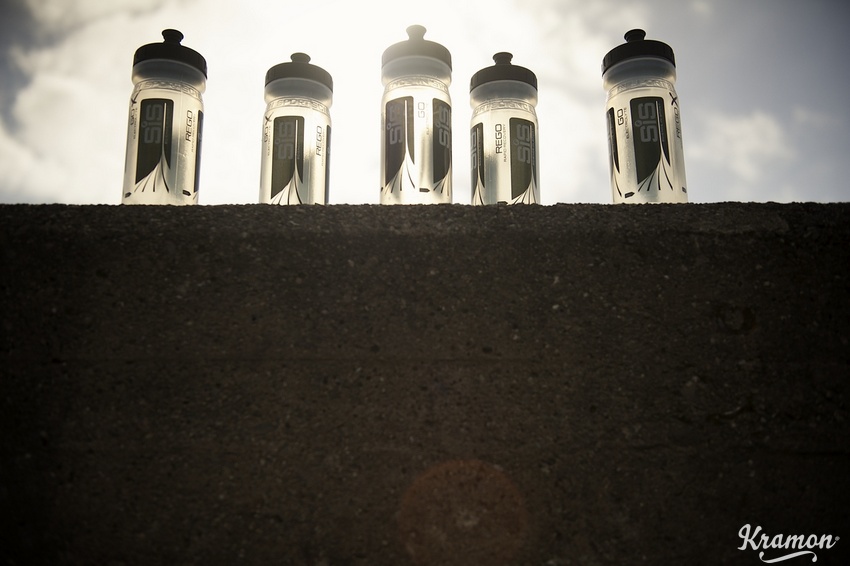The recommendation
Most sports nutrition textbooks and fact sheets will tell you that hydration is an important factor in maximising sporting performance. In 2010 the International Olympic Committee published its latest Consensus Statement on Sports Nutrition. The recommendations of the report were that “Athletes should be well hydrated before exercise and drink sufficient fluid during exercise to limit dehydration to less than about 2% of body mass.”
A similar statement appears in the American College of Sports Medicine Position Stand on Exercise and Fluid Replacement from 2007. These statements are based on almost a century of research, starting off with desert hikers and soldiers in the 1930s and progressing to athletes from a variety of abilities and sports since.
But are these recommendations based on a correct interpretation of the science?
I think there’s a problem with the conclusions that were made in these two statements. When you go back and examine the studies closely, two things become clear:
1. In almost all of these studies athletes were asked to exercise until exhaustion, and the difference in time-to-exhaustion between the well-hydrated and the poorly-hydrated groups was used to determine the effectiveness of replacing sweat losses during exercise.
2. With very few exceptions these studies achieved dehydration by not allowing the athletes in the dehydrated group to consume any fluid. Those in the well-hydrated group were generally asked to consume enough fluid to minimise the loss of body weight from sweating.
So what the studies are comparing is complete fluid replacement and no fluid replacement, and nothing in between. The interpretation of this data that’s been made over the years is that the difference in fluid loss (measured by weight loss pre- to post-exercise) is the factor that the body uses to regulate performance.
These two factors are important ones. Time-to-exhaustion testing is dramatically different to what occurs in real sporting events, and is now recognised as a poor way of studying exercise performance. Endurance sports almost always involve the athlete covering a certain distance in the shortest possible time, allowing the athlete to pace themselves however they see fit.
I also don’t know any endurance athlete (barring a major mishap) that would intentionally go into a race and not expect to drink for the entire event. Studies where fluid is completely withheld do not reflect the real world.
Comparing complete fluid replacement to absolutely no fluid consumption doesn’t make sense, and the only conclusion that can be made from these studies is “drinking lots of fluid is better than drinking nothing at all”.
But for athletes the real question is “what is the minimum amount of fluid I need to drink during exercise to optimise performance?” And that’s where things get interesting.
The research
So are there studies that actually compared different quantities of fluid intake in a time trial performance test? In April of 2011 Eric Goulet from the University of Sherbrooke in Canada published a meta-analysis, a statistical analysis of all the available studies comparing athletes that didn’t replace sweat losses during exercise to those that did.
Importantly he only included studies that measured performance by way of a lab-based “time trial”. The studies also had to be well controlled, so other factors like the amount of carbohydrate consumed didn’t interfere with the result. Amazingly, after 80 years of research in the area, only five studies were found that met these criteria! All five were published between 1995 and 2009.

The result of the meta-analysis? An average weight loss of 2.2% in the dehydrated groups compared to 0.4% weight loss in the well hydrated groups resulted in no difference in time trial power output whatsoever.
It’s important to note however that four of the five studies in this analysis used performance tests of only around one hour – hardly long enough for a significant fluid deficit to develop. Only one study has evaluated this effect over a longer distance.
That study came from the University of Cape Town in South Africa and was published in 2009. It involved participants riding an 80km time trial in the lab (with a finishing time of just under 2 hours and 10 minutes). The interesting thing about this study is that it’s the only one ever published that compared none or minimal fluid consumption with the participant’s own choice of fluid consumption (so-called “ad libitum” drinking), as well as prescriptive drinking to replace 33%, 66% and 100% of sweat losses.
The study was also conducted in the heat (33 degrees C), whereas many other studies were run in milder conditions. It’s also one of the only studies to correctly simulate airflow, by placing large fans in front of the cyclists at a speed that replicates the wind resistance encountered outdoors. This alone has been shown to make a significant difference to body temperature and sweat losses during exercise. That’s why you always sweat more on the ergo indoors compared to riding on the road.
The findings of this study make for very interesting reading. Participants who drank ad libitum (which resulted in 51% of sweat losses being replaced, and a 2.1% loss of weight over the duration of the time trial) improved their performance by 3% (or almost four minutes over 80km) compared to drinking nothing at all. But the really interesting finding was that drinking above ad libitum levels did not improve performance any further. The graph below shows the results from all six conditions in the trial.

Figure 1. Effect of various hydration strategies on 80km TT cycling performance. Graph drawn from results table in Dugas et al. (2009).
There are also studies of hundreds of marathon competitors where body weight change (and therefore sweat losses not replaced) were compared with finishing times. It’s been found that there is an association between the amount of fluid lost (and not replaced) with finishing time in a marathon. The more “dehydrated” athletes are, the better the finish time!
However that’s not to say that dehydration improves performance, because this sort of study cannot prove if one factor caused the other. What it does suggest is one of two possible scenarios. Firstly the faster runners may tolerate dehydration better than slower runners. Secondly, and more likely, is that this level of dehydration neither helps nor hinders performance during a marathon.
The slower runners probably drink more simply because they are much more focused on simply getting to the finish line in one piece, and they drink more because they think it will assist them with this.

Figure 2: Relationship between weight loss and finish times in 643 marathon runners. Source: Zouhal et al. (2009).
So what does it all mean?
The results from the Cape Town study suggest that while dehydration does reduce performance in an 80km cycling time trial, it only does so when fluid is not made available at all during exercise. It also suggests that it’s not weight loss per se that reduces performance, but the lack of availability of fluid to match the thirst drive of the athlete.
Remember that these subjects lost 2% of their body weight and had no reduction in performance, yet in other studies where 2% body weight was lost and fluid was withheld there was a significant performance decline.
There are some limitations to this conclusion for now. This is only a single study, and amazingly I’ve not seen a single follow-up study that’s attempted to replicate this result. I’ve also spoken to one of the authors of this study, who admitted that there was no measurements taken of thirst.
There was also no attempt to measure if the beliefs of study subjects about how much they thought they should drink influenced how much they actually chose to drink during the ad libitum trial.
And it remains unknown whether or not athletes need to drink more than they instinctively would in order to maximise performance for events longer than two hours.
The final problem is that studies of hydration are not “blinded” (participants always know whether they’re drinking more or less), increasing the chances of a placebo effect being seen. A recent study used intravenous hydration to blind subjects to which treatment they were getting (and made subjects eat ice chips to hide the thirst sensation when they were dehydrated). The performance test was only a 25km TT so it’s not a good indicator for longer events, but the use of IV fluids in hydration studies may be where we need to head with hydration research in the future.
Summary and final thoughts
For years sports scientists and dietitians have recommended athletes drink enough fluid to prevent a loss of body weight from sweat of more than 2% during exercise. However this recommendation is based on studies using performance tests that don’t resemble real world sporting events, and in most cases didn’t provide any fluid at all to the “dehydrated” group in the trial.

Only one study to date has been published comparing no fluid, ad libitum and aggressive fluid consumption, during a time trial performance test of around two hours duration. They found that ad libitum fluid consumption was sufficient to maximise performance, and additional fluid did not improve performance further. Whether ad libitum fluid consumption is sufficient in longer events remains unknown.
I have one final thought on the topic of how much to drink, and that’s to do with the practicalities. The human stomach empties at a maximum rate of just over one litre per hour during exercise (this does vary a bit from person to person). Even if sweat rates are higher than this there’s not much you can do about it.
On the other side of the coin remember that sports drinks during endurance exercise are not just there to provide fluid, they also contain carbohydrate. Given that aggressive carbohydrate consumption in longer events can enhance performance, reducing fluid consumption also comes at a cost of reduced carbs, which then has to be made up from solid foods and gels.
My conclusions:
- Hydration does affect performance, however fluid/weight loss is probably not the way the body regulates this.
- Therefore we still don’t have a great understanding of how the body does regulate performance based on hydration. It may be related to the thirst mechanism, but a single study where sensations of thirst weren’t measured and where there’s potential bias due to the hydration beliefs of participants, is not sufficient evidence to make this conclusion.
- Having inadequate fluid available to satisfy your thirst will most likely degrade performance, but it’s difficult at this stage to say what that amount should be for any given athlete on any given day. A ball-park estimation might be to drink to cover around 50-75% of sweat losses, but this needs to be confirmed through further research.
- Your starting level of hydration is likely to be important. If you start a race already partially dehydrated, then the amount you need to drink to satisfy thirst and prevent performance declines will likely be greater. If this volume exceeds what’s practical to carry or comfortably consume than performance degradation will occur.
About the author
Alan McCubbin is an Accredited Sports Dietitian, Accredited Practicing Dietitian and the President of Sports Dietitians Australia. He is the founder of Next Level Nutrition, an online sports nutrition consultancy, and works with the search2retain p/b health.com.au cycling team, the Tour de Cure cycling charity and a range of athletes from recreational to Olympians.
